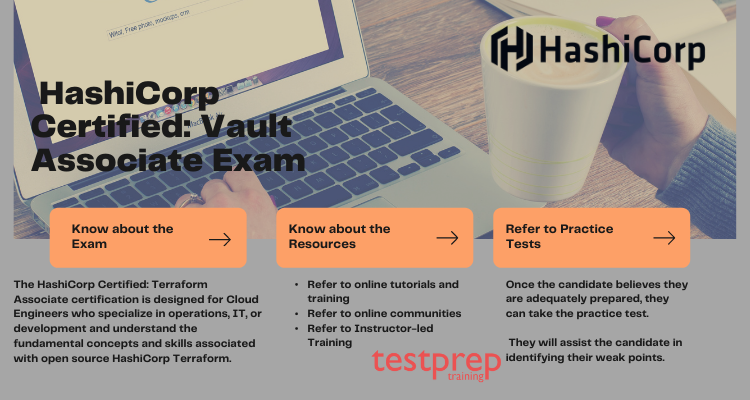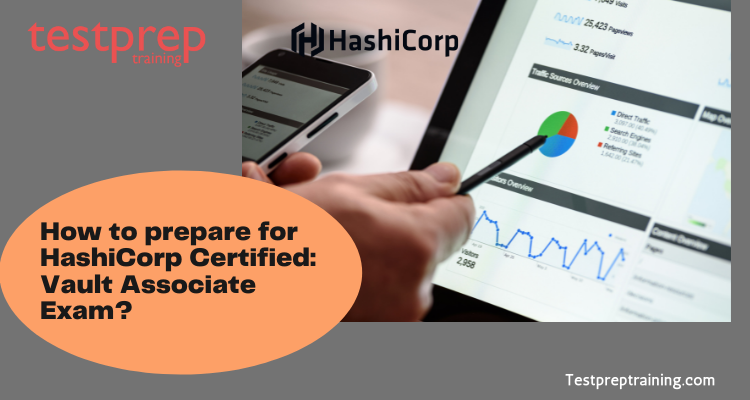Vault is a secret management tool that uses a UI, CLI, or HTTP API to secure, store, and tightly control access to tokens, passwords, certificates, and encryption keys for protecting secrets and other sensitive data. Let us begin our journey to prepare for HashiCorp Certified: Vault Associate Exam!
About HashiCorp Certified: Vault Associate Exam
The HashiCorp Certified: Vault Associate certification exam is designed for Cloud Engineers who specialize in security, development, or operations and understand the fundamental concepts, skills, and use cases associated with open source. Candidates for this exam benefit from professional experience using Vault in production, but performing the exam objectives in a personal demo environment may also suffice. Furthermore, it provides an understanding of enterprise features and what can and cannot be done with the open-source offering. After passing the exam, you will be able to easily communicate your proficiency, and your employers will be able to quickly verify your results.
Prerequisites
For the HashiCorp Certified: Vault Associate there are a few prerequisites:
- Firstly, Basic terminal skills
- Secondly, Basic understanding of on-premise or cloud architecture
- Thirdly, Basic level of security understanding
Exam Details | HashiCorp Certified: Vault Associate
Before you begin studying for the HashiCorp Certified: Vault Associate exam, you must thoroughly understand the exam format. It is always critical to conduct thorough research on the exam. Because this is a significant time and financial investment, you must be certain that it is the right certification for you.
The exam questions for HashiCorp Certified: Vault Associate are in Multiple Choice format. You will have 60 minutes to complete this online proctored exam. Furthermore, the exam is only available in English and is valid for two years. In addition, HashiCorp Certified: Vault Associate costs $70.50 USD plus any local taxes and fees.
| Exam Name | HashiCorp Certified: Vault Associate |
| Question Type | Multiple choice |
|---|---|
| Exam Type | Cloud Computing |
| Format | Online proctored |
| Duration | 1 hour |
| Price | $70.50 USD plus locally applicable taxes and fees |
| Language | English |
| Expiration | 2 years |
Let us now jump into the course outline of the exam –
HashiCorp Certified: Vault Associate Course Outline
The Official Exam Guide contains information about the exam domains. These domains cover a wide range of subtopics. This is to aid candidates in their exam preparation by identifying specific content within each topic that may be tested. This exam also includes ten domains-
1. Compare authentication methods
- 1a. Describe authentication methods ( HashiCorp Documentation: Auth Methods )
- 1b. also, Choose an authentication method based on use case ( HashiCorp Documentation: Authentication )
- 1c. furthermore, Differentiate human vs. system auth methods ( HashiCorp Documentation: Authentication )
2. Create Vault policies
- 2a. Illustrate the value of Vault policy ( HashiCorp Documentation: Policies )
- 2b. also, Describe Vault policy syntax: path ( HashiCorp Documentation: Policy Syntax)
- 2c. furthermore, Describe Vault policy syntax: capabilities ( HashiCorp Documentation: Capabilities )
- 2d. moreover, Craft a Vault policy based on requirements
3. Assess Vault tokens
- 3a. Describe Vault token ( HashiCorp Documentation: Tokens )
- 3b. also, Differentiate between service and batch tokens. Choose one based on use case ( HashiCorp Documentation: Tokens )
- 3c. furthermore, Describe root token uses and lifecycle ( HashiCorp Documentation: Root Tokens )
- 3d. moreover, Define token accessors ( HashiCorp Documentation: Token Accessors )
- 3e. also, Explain time-to-live ( HashiCorp Documentation: Token Accessors )
- 3f. furthermore, Explain orphaned tokens ( HashiCorp Documentation: Token Hierarchies and Orphan Tokens )
- 3g. moreover, Create tokens based on the need
4. Manage Vault leases
- 4a. Explain the purpose of a lease ID ( HashiCorp Documentation: Lease, Renew, and Revoke )
- 4b. also, Renew leases ( HashiCorp Documentation: Lease, Renew, and Revoke )
- 4c. furthermore, Revoke leases ( HashiCorp Documentation: Lease, Renew, and Revoke )
5. Compare and configure Vault secrets engines
- 5a. Choose a secret method based on the use case ( HashiCorp Documentation: Secrets Engines )
- 5b. also, Contrast dynamic secrets vs. static secrets and their use cases ( HashiCorp Documentation: Secrets Management )
- 5c. furthermore, Define transit engine ( HashiCorp Documentation: Transit Secrets Engine )
- 5d. moreover, Define secrets engines ( HashiCorp Documentation: Secrets Engines Overview )
6. Utilize Vault CLI
- 6a. Authenticate to Vault ( HashiCorp Documentation: Authentication )
- 6b. also, Configure authentication methods
- 6c. furthermore, Configure Vault policies
- 6d. moreover, Access Vault secrets
- 6e. also, Enable Secret engines ( HashiCorp Documentation: Secrets Engines )
- 6f. furthermore, Configure environment variables ( HashiCorp Documentation: Environment Variables )
7. Utilize Vault UI
- 7a. Authenticate to Vault ( HashiCorp Documentation: )
- 7b. also, Configure authentication methods ( HashiCorp Documentation: )
- 7c. furthermore, Configure Vault policies ( HashiCorp Documentation: )
- 7d. moreover, Access Vault secrets ( HashiCorp Documentation: )
- 7e. also, Enable Secret engines ( HashiCorp Documentation: )
8. Be aware of the Vault API
- 8a. Authenticate to Vault via Curl ( HashiCorp Documentation: Auth Methods )
- 8b. also, Access Vault secrets via Curl ( HashiCorp Documentation: Secrets Engines )
9. Explain Vault architecture
- 9a. Describe the encryption of data stored by Vault ( HashiCorp Documentation: Introduction to Vault )
- 9b. also, Describe cluster strategy
- 9c. furthermore, Describe storage backends ( HashiCorp Documentation: Storage Stanza )
- 9d. moreover, Describe the Vault agent ( HashiCorp Documentation: Vault Agent)
- 9e. also, Describe secrets caching ( HashiCorp Documentation: Vault Agent )
- 9f. furthermore, Be aware of identities and groups
- 9g. moreover, Describe Shamir secret sharing and unsealing
- 9h. also, Be aware of replication ( HashiCorp Documentation: Vault Enterprise Replication )
- 9i. furthermore, Describe seal/unseal
- 9j. moreover, Explain response wrapping ( HashiCorp Documentation: Response Wrapping )
- 9k. also, Explain the value of short-lived, dynamically generated secrets
10. Explain encryption as a service
- 10a. Configure transit secret engine
- 10b. Encrypt and decrypt secrets
- 10c. Rotate the encryption key
Let us now look at why you should take the exam –

Why take this exam?
In enterprise applications, secret management is critical. Organizations are migrating to multi-cloud infrastructure and deployments, and we have so many secrets and sensitive data that we must keep secure in order for applications to communicate with databases or each other. Vault simplifies the process and is cloud-agnostic. It is obvious that the future of fault-tolerant and highly available systems is multi-cloud, and it is worthwhile to invest in this tool to manage secrets and protect sensitive data. If you are developing applications in a multi-cloud environment, you will undoubtedly give it a shot.
Let’s look at some study materials that will assist you in passing the exam in one sitting –
Study Guide
The exam domains are described in detail in the HashiCorp Certified: Vault Associate Study Guide. It assists you in becoming acquainted with the exam concepts in order to perform well on the exam.
Review Guide
The HashiCorp Certified: Vault Associate Review Guide includes Documentation and Tutorials to assist you in gaining a thorough understanding of various concepts.
Vault of Documents: The documentation is more of a reference guide for all of Vault’s available features and options.
Tutorials: The Vault Tutorials help you learn more about Vault features and use cases. They are intended to provide you with an opportunity to engage more actively with the course content.
Interactive Labs
Hands-on experience is essential for the HashiCorp Certified: Vault Associate exam. As a result, you must learn by doing through Interactive Labs. They assist you in learning how to use Vault on real infrastructure in your web browser.
Practice tests
Finally, we’ve arrived at the final stage of preparation. However, before you begin practicing, ensure that you have completed the entire course and are well versed. As we say, self-evaluation will give you a better idea of whether you are skilled or not. Most importantly, self-evaluation will help you recognize your shortcomings. As a result, we recommend that you practice as much as possible. Remember that the more you practice, the better your results will be. So begin practicing right away!


